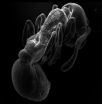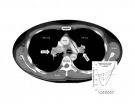(Press-News.org)
AUDIO:
This is a recording of ant pupa sound.
Click here for more information.
For young ants at the pupal stage of life—caught between larva and adulthood—status is all about being heard. The findings, reported online on February 7 in Current Biology, a Cell Press publication, add to evidence that ants can communicate abstract information through sound in addition to chemical cues.
"One of the truly fascinating characteristics of social insects is their power of self-organization, which allows their societies to achieve amazing feats way beyond the ability of individuals, and communication is key to these achievements," said Karsten Schönrogge of the Centre for Ecology & Hydrology (CEH) in the United Kingdom. "Our experiments are the first to show not only that ant pupae use sound to communicate with the adults in their colony, but also that the social ranking of mature pupae depends on their ability to make those sounds."
AUDIO:
This is a recording of worker ant sound.
Click here for more information.
Social insects were known to use chemical pheromones to recognize each other and to organize complex behaviors such as swarming. Researchers also knew that ants make audible sounds. But it wasn't so clear until recently that those sounds might actually mean something.
The new work, by scientists at CEH, University of Oxford, and University of Turin, shows that as soon as the ants' bodies begin to harden as pupae, they begin making sounds similar to adults with their "file and scraper" organs, although the sounds are first emitted as single pulses, not longer sequences.
It turns out that those sounds are essential for pupae to maintain their rightful place in the ant hierarchy, above their younger, larval siblings. When unstressed adult worker ants hear those sounds from pupae, they are assigned priority over their silent fellows in rescue operations back to the nest. Pupae experimentally rendered mute lose that higher-priority status.
The findings suggest that acoustics might actually replace chemicals as a mode of communication in this phase of an ant's social life, the researchers say. They also confirm that ants are able to send and receive signals across multiple information "channels."
"It seems highly likely that, in some situations, one type of signal might mediate the response to another," Schönrogge said. "The implications of this additional layer of flexibility need to be explored."
INFORMATION:
Current Biology, Casacci et al.: "Ant Pupae Employ Acoustics to communicate Social Status in their Colony's Hierarchy."
For ant pupae, status means being heard
2013-02-07
ELSE PRESS RELEASES FROM THIS DATE:
Researchers identify potential target for age-related cognitive decline
2013-02-07
As the elderly age, their ability to concentrate, reason, and recall facts tends to decline in part because their brains generate fewer new neurons than they did when they were younger. Now, researchers reporting in the February 7th issue of the Cell Press journal Cell Stem Cell have discovered a molecule that accumulates with age and inhibits the formation of new neurons. The finding might help scientists design therapies to prevent age-related cognitive decline.
The investigators identified the molecule, called Dickkopf-1 or Dkk1, in the brains of aged mice. By blocking ...
Reassuring evidence: Anticancer drug does not accelerate tumor growth after treatment ends
2013-02-07
Studies in animals have raised concerns that tumors may grow faster after the anticancer drug sunitinib is discontinued. But oncologists and physicists who collaborated to analyze data from the largest study of patients with kidney cancer convincingly demonstrate that such tumor acceleration does not occur in humans. The findings, publishing online on February 7th in the Cell Press journal Cell Reports, suggest that sunitinib does not cause lingering risks for patients after their treatment ends.
"We were able to demonstrate that this applied across all patients and that ...
Hopkins researchers uncover key to antidepressant response
2013-02-07
Through a series of investigations in mice and humans, Johns Hopkins researchers have identified a protein that appears to be the target of both antidepressant drugs and electroconvulsive therapy. Results of their experiments explain how these therapies likely work to relieve depression by stimulating stem cells in the brain to grow and mature. In addition, the researchers say, these experiments raise the possibility of predicting individual people's response to depression therapy, and fine-tuning treatment accordingly. Reports on separate aspects of the research were published ...
Treatment with clot-busting drug yields better results after stroke than supportive therapy alone
2013-02-07
In an update to previous research, Johns Hopkins neurologists say minimally invasive delivery of the drug tPA directly into potentially lethal blood clots in the brain helped more patients function independently a year after suffering an intracerebral hemorrhage (ICH), a deadly and debilitating form of stroke. Rates of functional recovery with the active tPA treatment far surpassed those achieved with standard "supportive" therapy that essentially gives clots a chance to shrink on their own.
In the current Johns Hopkins-led study, ICH patients who randomly received the ...
Clot-retrieval devices failed to improve stroke-related disability
2013-02-07
A stroke survivor's chances of living independently after 90 days are not improved by the use of devices inserted into the artery to dissolve or remove a stroke-causing clot shortly after the onset of symptoms, according to a randomized controlled trial involving 656 patients.
The study, funded by the National Institute of Neurological Disorders and Stroke (NINDS), part of the National Institutes of Health, compared the intra-arterial device-based approach plus the current standard of intravenous (IV) tissue plasminogen activator (t-PA), a clot-busting drug with IV t-PA ...
In the brain, broken down 'motors' cause anxiety
2013-02-07
VIDEO:
This video (S3 in the paper) shows the transport defect of the serotonin receptor in a KIF13A knock out neuron compared with a wild type neuron.
Click here for more information.
When motors break down, getting where you want to go becomes a struggle. Problems arise in much the same way for critical brain receptors when the molecular motors they depend on fail to operate. Now, researchers reporting in Cell Reports, a Cell Press publication, on February 7, have shown ...
Salmon may use magnetic field as a navigational aid
2013-02-07
CORVALLIS, Ore. – The mystery of how salmon navigate across thousands of miles of open ocean to locate their river of origin before journeying upstream to spawn has intrigued biologists for decades, and now a new study may offer a clue to the fishes' homing strategy.
In the study, scientists examined 56 years of fisheries data documenting the return of sockeye salmon to the Fraser River in British Columbia – and the route they chose around Vancouver Island showed a correlation with changes in the intensity of the geomagnetic field.
Results of the study, which was supported ...
Immune systems of healthy adults 'remember' germs to which they've never been exposed
2013-02-07
STANFORD, Calif. — It's established dogma that the immune system develops a "memory" of a microbial pathogen, with a correspondingly enhanced readiness to combat that microbe, only upon exposure to it — or to its components though a vaccine. But a discovery by Stanford University School of Medicine researchers casts doubt on that dogma.
In a path-breaking study to be published online Feb. 7 in Immunity, the investigators found that over the course of our lives, CD4 cells — key players circulating in blood and lymph whose ability to kick-start the immune response to viral, ...
Cells forged from human skin show promise in treating MS, myelin disorders
2013-02-07
A study out today in the journal Cell Stem Cell shows that human brain cells created by reprogramming skin cells are highly effective in treating myelin disorders, a family of diseases that includes multiple sclerosis and rare childhood disorders called pediatric leukodystrophies.
The study is the first successful attempt to employ human induced pluripotent stem cells (hiPSC) to produce a population of cells that are critical to neural signaling in the brain. In this instance, the researchers utilized cells crafted from human skin and transplanted them into animal models ...
Zinc helps against infection by tapping brakes in immune response
2013-02-07
COLUMBUS, Ohio – New research suggests that zinc helps control infections by gently tapping the brakes on the immune response in a way that prevents out-of-control inflammation that can be damaging and even deadly.
Scientists determined in human cell culture and animal studies that a protein lures zinc into key cells that are first-responders against infection. The zinc then interacts with a process that is vital to the fight against infection and by doing so helps balance the immune response.
This study revealed for the first time that zinc homes in on this pathway ...


